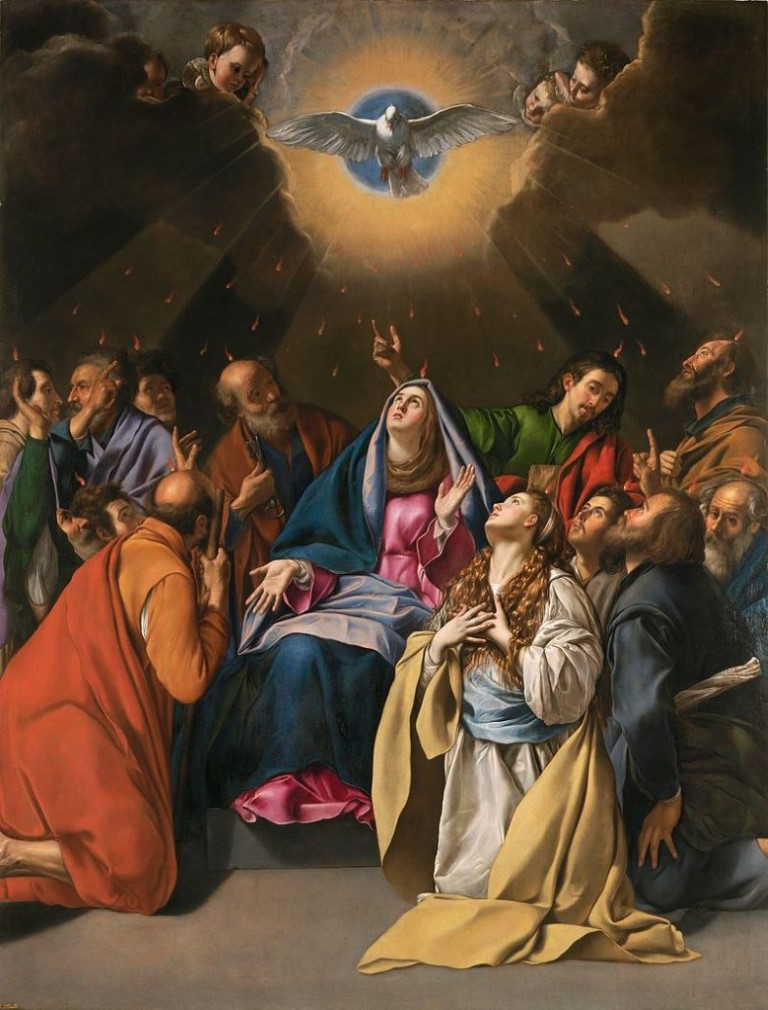Fr Paolo Consonni, MCCJ
Pentecost
“Jesus said to them again, ‘Peace be with you. As the Father has sent me, even so I send you.’ And when he had said this, he breathed on them, and said to them, ‘Receive the Holy Spirit.’” (Jn 20:21-22)
In the hot, humid weather these days, it is such a relief when I can take off the mask and freely breathe in some fresh air. I cannot imagine how those who have respiratory complications manage to bear with their discomfort. Covid has helped us to cherish the simple but essential action of breathing.
Breathing is synonymous with life: inhaling is the very first thing we do when we enter this world and exhaling the very last thing we do as we depart. Like the heartbeat, breathing is an automatic function, and we do not usually think about it. But unlike the heartbeat, breath can be consciously controlled. Breathing techniques are in fact employed especially for relaxation.
But breathing also has a deep religious significance. Many religions use breathing as a tool to facilitate prayer and meditation. The simple action of “breathing in, breathing out” naturally connects our bodies with our minds, the external with our inner-self.
Christian faith also attaches a sacred meaning to our breath. In Genesis we read that “the Lord God formed a man from the dust of the ground and breathed into his nostrils the breath of life, and the man became a living being” (Gen 2:7). In God’s breath, the Church has always seen the action of the Holy Spirit, “the “giver of life,” through whom human beings can live in communion with God. Furthermore, in the Gospel we proclaim in this Sunday’s Solemnity of Pentecost (Jn 20:19-23), the Risen Christ breathed the Holy Spirit on the Apostles while sending them into the world to share God’s Mercy and reconciliation. In the same way, the Holy Spirit breathed on us at Baptism and re-created us as new creatures.
Sometimes Catholics are a bit skeptic about using breathing as a way of praying. We are aware of the dangers of self-absorption. Christian prayer is not simply aimed to reach a psychological wellbeing, but it is always relational (directed to God and focused on listening to Him) and has an ecclesial character, even when we pray alone. Once this is clear, breathing can indeed become a powerful way to pray in the Holy Spirit.
In the biblical view, a person is not a soul imprisoned in a body which seeks to escape, but an integral unity of the two. The body is important for prayer, not an obstruction to it. In fact, we pray with the body, and specifically with our breathing, more often than we think. For example: the proclamation of the Scriptures, our participation in the communal liturgical prayer, the recitation of litanies, singing – all of these require a harmonic coordination between our breath and our spirit.
The Fathers of the Church understood the importance of breathing in relation to spirituality, and devised some methodologies to couple invocation and breath in order to remain in a prayerful state, even while working. “Always breathe Christ,” St. Anthony (4th century) used to say to the monks. Later, their teachings were concretized into “The Prayer of the Heart” (or “The Prayer of Jesus”) that many Christians are using, especially in the Orthodox Church.
Breathing also expresses the dynamism of Christian life in its totality. When we breathe in, we experience our dependency on God and on His saving power. When we breathe out, we entrust ourselves to Him and we manifest our availability to share His love with the world.
Some years ago, Pope Francis said: “Breathing is made up of two stages: inhaling, the intake of air, and exhaling, the letting out of this air. The spiritual life is fed and nourished, by prayer and is expressed outwardly through mission. When we inhale, by prayer, we receive the fresh air of the Holy Spirit. When exhaling this air, we announce Jesus Christ risen by the same Spirit. No one can live without breathing. It is the same for the Christian: without prayer and mission there is no Christian life. […] The breathing of Christians draws in the new air of the Holy Spirit and then exhales it upon the world: it is the prayer of praise and missionary outreach. (Address to the “Catholic Fraternity of Charismatic Covenant Communities and Fellowship,” 31 October 2014).
St. Augustine prayed with these words:
“Breathe in me, O Holy Spirit, that my thoughts may all be holy.
Act in me, O Holy Spirit, that my work, too, may be holy.
Draw my heart, O Holy Spirit, that I love but what is holy.
Strengthen me, O Holy Spirit, to defend all that is holy.
Guard me, then, O Holy Spirit, that I always may be holy.”
In the Holy Spirit, holiness is no longer an unreachable ideal, but a concrete life-long journey possible for everyone. A journey of Love, of Grace, of Mercy to be made one step after another, one choice after another, one breath after another…


 Follow
Follow


